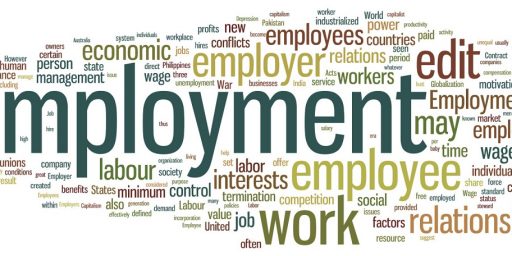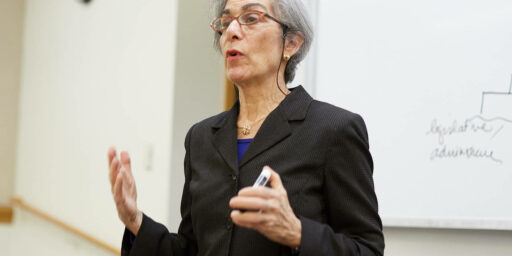Income Inequality and Education
In a column for the NYT, Tyler Cohen argues that barriers to higher education are much more significant contributors to income equality in the United States than, outsourcing, immigration, the tax system, the gains of the super-rich and various other hot button issues. There are some excellent comments on the article in response to his blog post introducing it.
I don’t doubt that there are Americans who could do well in good colleges who don’t go for various cultural and economic reasons. And no one who has taught college students would argue that we couldn’t do better in preparing our high school students for the academic rigors of college.
Still, I remain unconvinced that sending an ever-larger percentage of our population on to university study and then to graduate school is the answer. Our public policy should instead aim at making sure that people have the maximum opportunity to be prepared to utilize their natural talents. Not everyone has the aptitude for college and we already have far too many people getting college degrees who then go on to jobs that do not make use of the critical thinking skills college is supposed to impart.
We absolutely need to level the playing field at the primary and secondary school level so that bright students from poor families get the same preparation to succeed on the academic track as those from wealthy families. At the same time, we need to rid ourselves of the notion that going on to technical school or otherwise learning a trade is a fallback position for people who can’t get into college. After all, a good plumber or electrician will almost certainly command a better wage than a college professor or journalist.






I think that it’s quite possible that Tyler is right about immigration, maybe about outsourcing, and probably about the tax system but I think that he’s putting too many eggs in the same basket. For example
Read Tyler’s op-ed carefully. He doesn’t try to make the case that more education would enable average people to offset the income gains of the super-rich because that argument is unmakeable. There have been months in which the entirety of the increase in GDP can be attributed to sales of stock by a handful of Microsoft employees. In this case the argument that Tyler makes is that we’re all better off because of the contributions of the super-rich to the economy. IMO that’s a Panglossian blindness to opportunity costs but, then, what do I know? Again IMO the tremendous increases in wealth among a relative handful of Americans can largely be attributed to a change in policies and technology that have tended to benefit the ownership of assets over labor. Whether we should reform that is another question entirely (and the real argument that Tyler makes in this particular case).
I’d like to see the actual numbers.
While it’s all well and good, if everyone has a college degree, it only serves to cheapen the worth of such a degree. When most Americans’ highest level of education was high school, a bachelors degree meant something. Now that most HS kids go on to college, it no longer means as much as it used to. Now you’ll have to get a graduate degree to stand above the rest. We will always need unskilled workers to do the dirty work the rest of us won’t do. We will always need skilled tradesmen, machinists, blue collared workers to keep our society functioning. There’s nothing wrong with not going to college and learning a trade. We need to revive vocational technical training and apprentice programs.
A few points here…
I agree very much with James about trades as a fall back position, schools don’t even teach trades anymore and this is an outrage (particularly while the frothing over evolution goes on unabated.)
The fact is that most jobs do not require the skills obtained in higher education yet the realities of the job market demand, at minimum, a bachelors degree before one is even allowed to apply. So resources that would otherwise be used for more productive purposes are being spent to educate people so that Human Resources can have a pricey signaling mechanism to sort out the resume pile. Perhaps we need to get HR to do their job instead of being highly paid paper shufflers and test givers
Retraining, count me in as one who is on their forth “retraining”. It’s getting old to have to start at the bottom simply because I have bought into the myth that if the economy shifts it’s my fault.
As for (from the article):
Can we just open fire now, I mean if it’s class war they want, stuff like this is “first blood”.
Look I get that the economy is not a “zero sum game“, it is also not “bandwidth on demand“. People like this would have us believe that the top 1% only gains their wealth from the % of the new growth in the pie. Even if that were true it would mean that the rest of us are working harder and taking or lumps so that that new wealth can be distributed to someone else. Forgive me if I vote against that. Every year, no matter how you slice it, no matter how big the pie gets, there are zero sum “reallocations” taking place and the more that happens the more people get rightly pissed off.
Finally we are well into a complete change over to a jackpot economy where if you work hard, get educated, keep you nose clean, and follow the rules all you will have bought yourself is a lottery ticket in the “good job” sweepstakes. That will only hold back the barbarian hoard for so long.
Credentialisum has run amok, higher education is turning into a racket, and more and more people are being asked to chase fewer and fewer good jobs every year. This my friends is a recipe for disaster.
Dave;
Tyler may not be making that case, but I can see where james would think he did… and particularly so since this is so often the knee jerk reaction.
James:
You know how it is; The person with the hammer thinks every problem can be treated like a nail. Most often, the argument for everyone going on to higher education, is made by those whose living is made on PROVIDING that higher education… which to my mind makes their estimates on the relative income of those ‘benefitting’ from such higher education suspect at least, much the same as would be anyone hawking the benefits of buying this particular used car.
In any event, I’m not sure that designing educational policy with the inetnt of leveling the pay levels of all Americans… the apparent goal, here… is something we should be doing in a capitalistic society.
Yep yep. A good solid university system and a parallel solid trade/apprenticeship system would be ideal.
I think we currently over emphasize college to the detriment of students.
While the old notion of tracking should have been tossed by the wayside, a lot of public schools ditched excellent vocational programs and started just pushing college track for a lot of people who may not need to be on it.
Around here a qualified plumber is in high demand and can make more money per hour of work than more than half the college educated in the area. We have a friend that runs a garage, and he struggles to find and keep qualified mechanics. A well qualified mechanic around here can make more money than a first year teacher, much less some other jobs that require a college degree.
I would like to see students encouraged and counseled to consider other avenues of education, training and certification, not neccessarily college.
The problem is the institutionalization of the following illogic: “The top 10% of income earners all have college degrees, therefore, if all people have college degrees, they will all be in the top 10% of income earners”. The short answer is that the only way to provide a “college education” to everyone is to thoroughly debase what “college education” means, and that is what is being done. Put differently, the “college for all” movement is just a massive resource re-allocation from parents to “educators” — a deliberate migration away from “free” ie tax-funded education to “fee” education. Less and less is taught in high school and more is shifted to college. And make no mistake, there is always a school that will take your money and give you a degree.